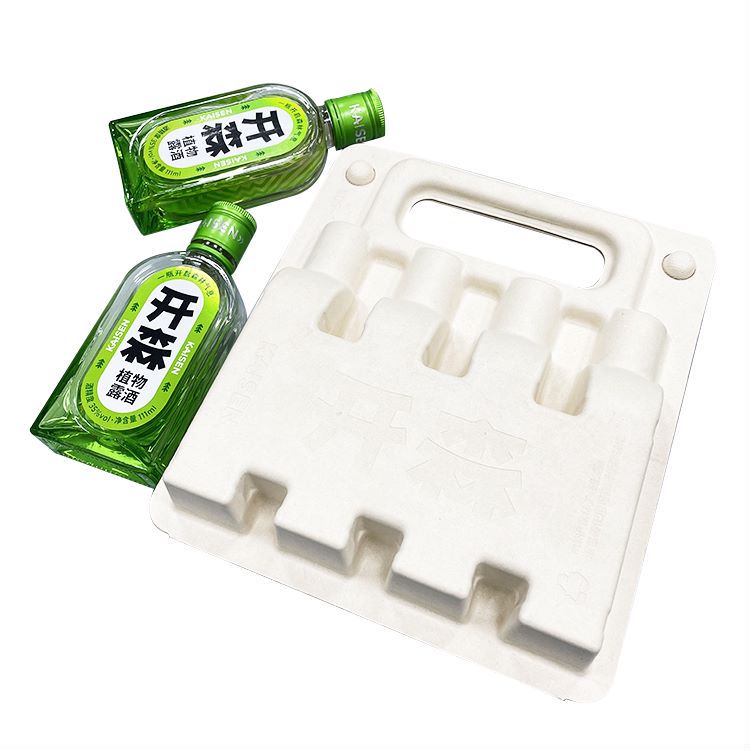In the global quest for eco-friendly alternatives, molded paper pulp has emerged as a sustainable powerhouse, revolutionizing the packaging industry. This article delves into the multifaceted reasons why molded paper pulp is increasingly favored for packaging applications, exploring its environmental benefits, versatile applications, manufacturing process, and its pivotal role in the paradigm shift towards sustainable packaging solutions.

1. Environmental Sustainability:
At the core of the widespread adoption of molded pulp packaging lies its impeccable environmental sustainability. Crafted from recycled paper or other natural fibers, molded pulp serves as a direct response to the urgent need for reducing the ecological footprint of packaging materials. Unlike traditional plastics, molded pulp is biodegradable and compostable, ensuring minimal impact on the environment and contributing to a circular economy.
2. Biodegradability and Compostability:
Molded paper pulp is inherently biodegradable and compostable, making it a champion in the fight against the mounting concerns of plastic pollution. When disposed of, molded pulp decomposes naturally, returning to the environment without leaving behind harmful residues. This characteristic aligns seamlessly with the growing demand for packaging solutions that break the shackles of long-lasting environmental impact associated with conventional materials.
3. Versatile Applications:
Beyond its eco-friendly attributes, molded paper pulp stands out due to its versatile applications across diverse industries. Initially recognized for its excellence in protective packaging, molded pulp has evolved to become a preferred choice for industries ranging from electronics and healthcare to food and beverage. Its adaptability allows for custom-molded designs, making it an ideal solution for products of varying shapes and sizes.

4. Effective Protective Packaging:
Molded paper pulp's effectiveness in protective packaging is a testament to its versatility. The material provides a cushioning effect, absorbing shocks and vibrations during transportation and ensuring the safe delivery of fragile items. The ability to conform to intricate shapes enhances its utility in securing products, making it an indispensable choice for companies prioritizing both sustainability and product safety.
5. Manufacturing Process:
The manufacturing process of molded paper pulp is a key factor in its adoption for packaging. Typically produced through a wet molding process, recycled paper is transformed into the desired shape by utilizing molds. The simplicity and efficiency of this process contribute to the economic feasibility of molded pulp production. Advanced technologies, such as 3D modeling and automation, further enhance precision and speed in manufacturing.
6. Cost-Effective Production:
Molded paper pulp's cost-effectiveness is another factor driving its widespread use in packaging. The use of recycled materials, coupled with streamlined manufacturing processes, makes molded pulp an economically viable choice. As industries seek sustainable alternatives without compromising their bottom line, the cost-effectiveness of molded paper pulp positions it as a pragmatic and eco-conscious solution.
7. Consumer Preference for Sustainable Packaging:
A notable shift in consumer preferences towards sustainable products has become a driving force in the adoption of molded paper pulp packaging. Informed and environmentally conscious consumers actively seek products packaged in materials that align with their values. The eco-friendly attributes of molded pulp resonate with this growing demographic, influencing purchasing decisions and driving demand for sustainable packaging options.

8. Branding and Corporate Social Responsibility:
Molded paper pulp packaging has become an integral part of corporate social responsibility (CSR) strategies for many businesses. Adopting sustainable packaging solutions like molded pulp aligns with broader sustainability goals, enhancing a company's image as an environmentally responsible entity. This positive branding effect contributes to the overall market growth of molded paper pulp in the packaging industry.
Conclusion: A Green Future for Packaging
In conclusion, the utilization of molded paper pulp for packaging is not just a trend but a paradigm shift towards sustainable and responsible practices. Its environmental sustainability, versatility, effective protective properties, cost-effective production, and alignment with consumer preferences and corporate social responsibility collectively position it as a formidable player in the green revolution within the packaging industry. As industries and consumers alike continue to prioritize sustainability, molded paper pulp remains at the forefront, offering a compelling solution that transcends mere functionality to embody a commitment to a greener and more sustainable future.

